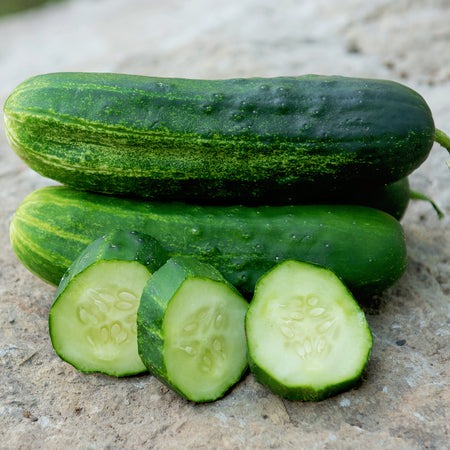60 days. Wautoma is a consistent standout in our trials. Developed by the USDA, it produces huge crops of wonderful 4–5 inch picklers, often of better quality than the hybrids. Four to five foot plants resist nearly all cucumber diseases! Delightfully bitter-free and burpless, Wautoma has been tested for brining quality to ensure your pickling success.
Cucumis sativus A favorite in cuisine worldwide, cucumbers possess health benefits too numerous to mention. Incorporate cucumbers in your diet to aid with weight loss, as they are exceptionally low in calories (only about 8 calories in 1/2 cup), aid digestion, and rid toxins from the body. Among the more unusual qualities of the humble cuke is its ability to ease skin irritations. Use a piece of cucumber skin to soothe burns.
Days to maturity are calculated from date of direct seeding.
Culture
• Cucumbers perform best in fertile, well-drained soil with a pH 5.5-7.0
• Consistent, even watering is critical for best plant growth and fruit development
• Raised beds, plastic mulch, and trellising can improve yields, keep fruit straight and scab free
• Incorporate a shovelful of compost and 1/2 cup TSC's Complete fertilizer per hill
Direct Sowing
• For best germination, keep soil evenly moist but not too wet
• Cover hill with Kozy-Coats, Victorian Bell Cloches, or a row cover to speed up germination
• Thin to the strongest 1-2 plants when first true leaves emerge
Transplanting
• Start indoors in 4 inch pots, 3-4 weeks before anticipated transplant date
• Avoid letting starts get root bound; transplant carefully as to not disturb roots
Pests & Diseases
• Common pests: Striped and spotted cucumber beetles, aphids, squash bugs, stink bugs
• Pest control: Pyrethrin
• Common diseases: See chart below
• Disease prevention: 3-4 year crop rotation, Zonix for Powdery Mildew
Harvest & Storage
• Consistent harvest will keep plants productive
• Store at 45°F and 95% relative humidity
• For pickling, harvest cukes when small, before seeds form
KEY TO FLOWERS AND FRUIT SET
GY | Gynoecious - Has nearly all female flowers.
HE | Hermaphrodite - Flowers contain both male and female reproductive parts.
MO | Monoecious - Has separate male and female flowers on the same plant.
PAT | Parthenocarpic - Has the ability to set fruit without pollination.
KEY TO CUCUMBER DISEASE RESISTANCE AND TOLERANCE
HR indicates high resistance.
IR indicates intermediate resistance.
A | Anthracnose*
ACu | Alternaria Leaf Blight
ALS | Angular Leaf Spot
C | Cercospora
CCa | Corynespora Blight & Target Spot
CCu | Scab & Gummosis
CMV | Cucumber Mosaic Virus
CVYV | Cucumber Vein Yellowing Virus
CYSDV | Cucurbit Yellow Stunting Disorder Virus
DM | Downy Mildew
PM | Powdery Mildew
R | Common Rust
S | Scab
TSP | Target Spot
* Numbers indicate specific disease race.
Cucumis sativus A favorite in cuisine worldwide, cucumbers possess health benefits too numerous to mention. Incorporate cucumbers in your diet to aid with weight loss, as they are exceptionally low in calories (only about 8 calories in 1/2 cup), aid digestion, and rid toxins from the body. Among the more unusual qualities of the humble cuke is its ability to ease skin irritations. Use a piece of cucumber skin to soothe burns.
Days to maturity are calculated from date of direct seeding.
Culture
• Cucumbers perform best in fertile, well-drained soil with a pH 5.5-7.0
• Consistent, even watering is critical for best plant growth and fruit development
• Raised beds, plastic mulch, and trellising can improve yields, keep fruit straight and scab free
• Incorporate a shovelful of compost and 1/2 cup TSC's Complete fertilizer per hill
Direct Sowing
• For best germination, keep soil evenly moist but not too wet
• Cover hill with Kozy-Coats, Victorian Bell Cloches, or a row cover to speed up germination
• Thin to the strongest 1-2 plants when first true leaves emerge
Transplanting
• Start indoors in 4 inch pots, 3-4 weeks before anticipated transplant date
• Avoid letting starts get root bound; transplant carefully as to not disturb roots
Pests & Diseases
• Common pests: Striped and spotted cucumber beetles, aphids, squash bugs, stink bugs
• Pest control: Pyrethrin
• Common diseases: See chart below
• Disease prevention: 3-4 year crop rotation, Zonix for Powdery Mildew
Harvest & Storage
• Consistent harvest will keep plants productive
• Store at 45°F and 95% relative humidity
• For pickling, harvest cukes when small, before seeds form
KEY TO FLOWERS AND FRUIT SET
GY | Gynoecious - Has nearly all female flowers.
HE | Hermaphrodite - Flowers contain both male and female reproductive parts.
MO | Monoecious - Has separate male and female flowers on the same plant.
PAT | Parthenocarpic - Has the ability to set fruit without pollination.
KEY TO CUCUMBER DISEASE RESISTANCE AND TOLERANCE
HR indicates high resistance.
IR indicates intermediate resistance.
A | Anthracnose*
ACu | Alternaria Leaf Blight
ALS | Angular Leaf Spot
C | Cercospora
CCa | Corynespora Blight & Target Spot
CCu | Scab & Gummosis
CMV | Cucumber Mosaic Virus
CVYV | Cucumber Vein Yellowing Virus
CYSDV | Cucurbit Yellow Stunting Disorder Virus
DM | Downy Mildew
PM | Powdery Mildew
R | Common Rust
S | Scab
TSP | Target Spot
* Numbers indicate specific disease race.
